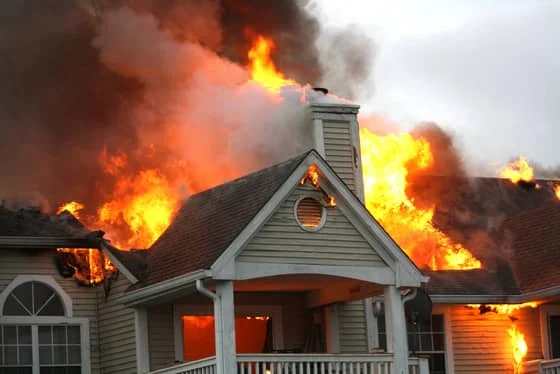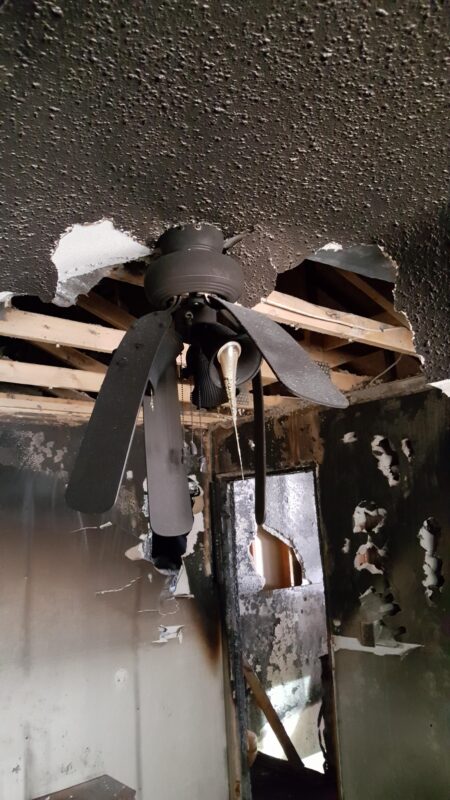Introduction
Many residences feature ceiling fans, which provide a pleasant breeze and assist to increase air circulation throughout several seasons. Many times viewed as energy-efficient substitutes for heating and air conditioning systems are they. But have you ever wondered Can Leaving a Ceiling Fan On Cause a Fire? Homeowners who run ceiling fans constantly have a similar worry.
This article will go over the possible fire hazards, the safety of leaving your ceiling fan on for long stretches of time, and how you could make sure your fan runs properly.

Can a Ceiling Fan Cause a Fire?
Many homes have ceiling fans, which create a nice breeze and help to improve air circulation all through multiple seasons. Many times seen as effective substitutes for air conditioning and heating systems are they But have you ever thought about whether leaving a ceiling fan running could ignite a fire? Constant running ceiling fans among homeowners cause a similar concern.
The various fire threats, the safety of leaving your ceiling fan on for extended periods of time, and how you could ensure your fan functions correctly will all be covered in this article.

1. Electrical Malfunctions and Faulty Wiring
Electrical problems are one of the main hazards connected with ceiling fans. A ceiling fan may overheat from a defective connection, worn-out wire, or an overloaded circuit, hence maybe starting a fire. When the fan is correctly placed and operated upon, this is rare, nevertheless.
How to Prevent Electrical Malfunctions:
- Make sure the qualified electrician you hired installed your ceiling fan. An incorrectly placed fan with bad wiring could be hazardous.
- Regularly check the power cord and wiring of the fan for any indications of damage including fraying, cuts, or exposed wires. Should you discover problems, immediately switch off the fan and have a professional fix them.
- Never overload any electrical circuit. Should your ceiling fan run on a circuit shared by another high-power appliance, such an air conditioner or heater, an electrical fire could result.
2. Fan Motor Overheating
Most contemporary ceiling fans are made with robust motors safe for running for extended lengths of time. On the other hand, the motor may overheat and maybe start a fire if it is choked with dust or lacks appropriate lubrication. This is particularly likely if the fan runs continuously for long stretches without maintenance at high speeds.
How to Prevent Motor Overheating:
- Regular cleaning helps dust to build on the motor and the blades. This lowers airflow and forces the motor to operate harder, maybe resulting in overheating. Every few months, clean the blades and motor on your fan to stop accumulation.
- Verify the motor of the fan to be fully greased. While some fans are made with sealed motors that don’t need periodic maintenance, others are made for such needs. To find out what’s ideal for your model, see manufacturer recommendations.
- Although leaving the fan on for long periods is usually safe, you should always turn it off before leaving the room or at night to avoid needless motor wear.
3. Poor Fan Maintenance
Neglectful maintenance of ceiling fans might cause fire hazards. Should blades be misaligned, the fan loses balance; should the wiring of the fan be loose, friction or sparks could result, perhaps starting a fire.
How to Prevent Poor Maintenance:
- Unbalance of fan blades can strain the motor and cause overheating. Verify the blades’ correct installation, cleanliness, and equal spacing. Turn off the fan right away and look for any problems if you find it wobbling or producing odd sounds.
- Replace damaged ceiling fan components including the motor or switch over time to prevent wear-on. Replace any component of the fan right away if it seems damaged or defective to prevent possible hazards.
4. Fan Age and Quality
Older fans or inexpensive, low-quality ones are more prone to run across problems including general wear and tear, overheating, and electrical failures. Older supporters might lack contemporary safety features and energy-efficient technologies, which would raise their likelihood of a malfunction.nction.
How to Ensure Fan Safety:
- If your ceiling fan is more than 10 to 15 years old, it could be time to replace it with a safer, newer one. Search for fans featuring energy-efficient motors and overheat prevention.
- Invest in premium ceiling fans from reputable companies. Usually featuring more dependable motors and safety features to reduce malfunction risk, high-end modelsions.
5. Leaving the Fan on When Not Needed
Safety does not depend on running your ceiling fan 24/7, particularly when you are not in the room; worse, it could lead to unnecessary fan wear and tear. Although ceiling fans use little power, leaving them running nonstop is not energy-efficient, and it could strain the motor.
How to Avoid This Issue:
- Install a timer or utilize a smart home system to automatically switch off the fan upon a designated period, or when you’re not in the room. This will stop needless wear and lessen the burden on the fan.
- Always switch off your fan when you leave a room or overnight, particularly if it is not absolutely necessary to have the air moving.
6. Other Potential Fire Hazards
Although ceiling fans by themselves are unlikely to start fires, various elements can raise the risk:
Keep combustible items far from the fan and its motor. Store paper, cloth, or other combustible items, for instance, far from the fan.
Unless the fan is rated for such settings, avoid running it in places where it could come into contact with water, such restrooms, or in surroundings with high humidity.
FAQ
Can a ceiling fan catch fire? Though it is unusual, problems with the motor, wiring, or improper maintenance could cause a ceiling fan to catch fire. Minimizing these dangers will depend on regular maintenance, correct installation, and following manufacturer recommendations for use of the fan.
How often ought I to check my ceiling fan for safety? Every few months, look for wear on your ceiling fan including frayed wires, loose components, or dust accumulation. Should you find any problems, immediately switch off the fan and fix them.
Should one leave a ceiling fan running all day? Although leaving a ceiling fan on for extended lengths of time is usually safe, you should always make sure the fan is kept in good condition. One recommended habit to save needless wear is turning off the fan when not needed or running timers to regulate its running state.
How might I stop my ceiling fan from overheating? Clean the fan often, lube the motor as needed, and make sure the fan is balanced to help to prevent overheating. Steer clear of running the fan nonstop for long stretches without maintenance.
Conclusion
If a ceiling fan is installed appropriately and kept well-maintaining, leaving it on 24/7 is usually safe. The most often occurring hazards come from damaged components, bad wiring, or neglected maintenance. Following correct safety precautions will help you to guarantee that your ceiling fan runs for years to come without problems: frequent cleaning of the fan, damage detection, and efficient use of it.
Get Expert Advice Right Now by Contacting Us!
- Email: info@blowox.com
- Visit: blowox.com




Top 10 Best Outdoor Patio Ceiling Fans to Beat the Heat in 2025
Having the best outdoor patio ceiling fan will make all the difference in how much [...]
Top 10 Best 3 Blade Ceiling Fans for Modern Homes in 2025
Finding the best 3 blade ceiling fan can transform the ambiance and comfort of your [...]
Reviews, Features, and Shopping Advice for 2025’s Best Modern Ceiling Fans
Modern ceiling fans have evolved from a mere cooling solution to a statement of efficiency [...]
How to Operate a Ceiling Fan: Expert Tricks to Save Money and Stay Cool
More than merely ornamental accents, ceiling fans are reasonably priced means of improving comfort and [...]
Top 10 Cheap Outdoor Ceiling Fans That Offer Style and Durability in 2025
Finding the ideal cheap outdoor ceiling fan does not mean you have to give up [...]
Does Leaving a Ceiling Fan On Waste Electricity? 5 Surprising Facts You Should Know
Many homes find ceiling fans to be the go-to fix for home comfort. Still, a [...]
Does Reversing a Ceiling Fan Make It Warmer? The Winter Home Hack You Need to Know
Homeowners sometimes look for creative solutions to keep their houses comfortable without going broke as [...]
Does Reversing a Ceiling Fan Work? The Winter Energy Hack You Need to Know
Heating bills can explode when temperatures fall. You might be asking: Does reversing a ceiling [...]
Does Running a Ceiling Fan Help with Air Conditioning? 5 Surprising Benefits You Need to Know
Maintaining coolness in your environment may be both a need and a comfort throughout summer. [...]
The Ultimate Guide to Choosing the Best Ceiling Fan for Small Room
Choosing the Best Ceiling Fan for Small Room will revolutionize the comfort and design enhancement [...]